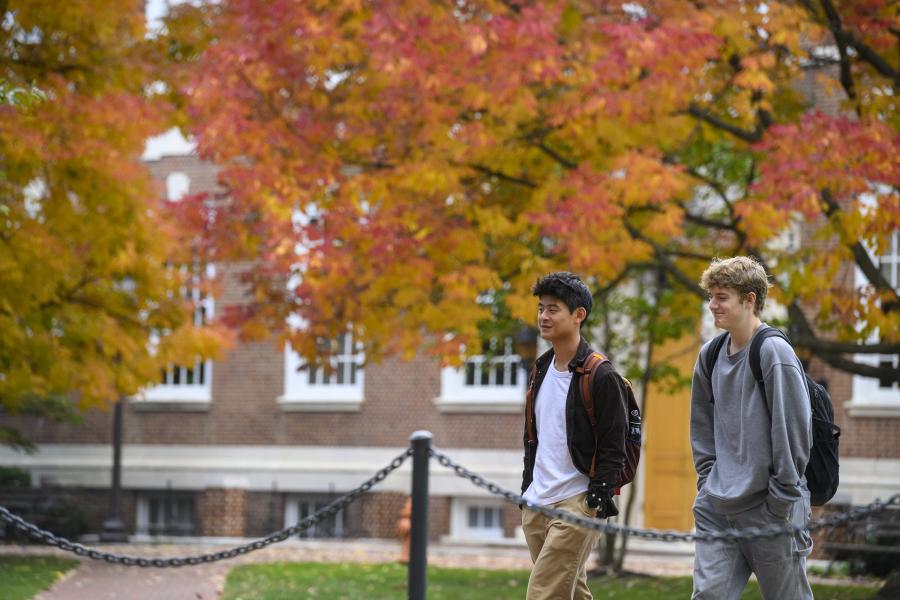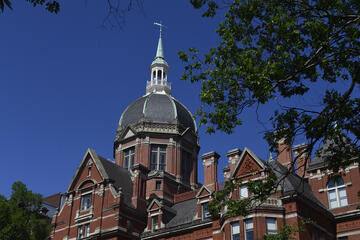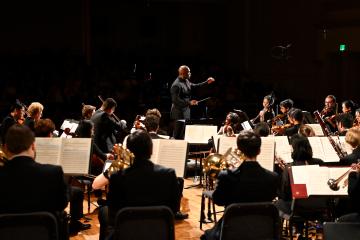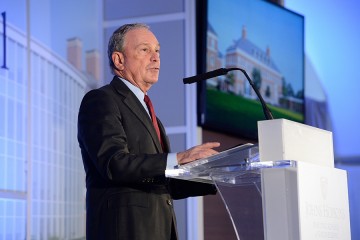- Name
- Johns Hopkins Media Relations
- jhunews@jhu.edu
- Office phone
- 443-997-9009
Since its founding, Johns Hopkins University has been committed to the vision that a great university should be available to all students based on merit, not means. This commitment was dramatically expanded with the unprecedented $1.8 billion gift made by alumnus Michael R. Bloomberg in 2018, which allowed the university to become permanently need blind and no-loan in financial aid.
Expanding on that vision, Johns Hopkins will now be tuition-free for all undergraduate students from families earning up to $200,000 a year. As a result of the change, which applies to undergraduates at JHU's Homewood campus, students representing more than 85% of American households, according to U.S. Census data, will be able to attend Johns Hopkins without having to pay tuition.
Students from families earning up to $100,000 will receive additional aid to cover tuition, fees, and living expenses, allowing them to attend Hopkins with a $0 parent contribution. This means students from a majority of American families, including middle-class families earning above the national median household income of $87,730, can attend Hopkins at no expense.
The new aid levels for Hopkins undergraduates will go into effect for eligible current students in the spring 2026 semester and for new, incoming students next fall for the 2026-2027 academic year.
For households earning more than $200,000, the university will continue to offer generous financial aid to meet 100% of need. Most families with incomes up to $250,000 will continue to qualify for significant financial aid. Even those with annual incomes exceeding $250,000 may qualify, especially when there are multiple children in college at the same time.
The tradition of attracting the best students based on merit dates back to the earliest days of the university, when founder and namesake Johns Hopkins shared a vision of welcoming students based on "their character and intellectual promise" rather than their financial circumstances. JHU President Ron Daniels reinforced that vision early in his presidency by expanding financial aid and ending admissions preferences for undergraduates based on their legacy status.
In a message to the Hopkins community today, Daniels shared his excitement that the gift will aid "in recruiting the best and brightest students to Johns Hopkins irrespective of their financial wherewithal." He encouraged people across the Hopkins community to share "this significant news with all outstanding students who are interested in pursuing a Johns Hopkins education, and with their families who want to see them reap the lifelong benefits of higher education."
Under the auspices of the 2018 Bloomberg gift, Hopkins was able to significantly expand the enrollment of limited-income students while increasing the academic qualifications of its incoming classes. From 2018 to 2025, the percentage of limited-income students in the entering first-year class, measured by the number of students eligible for federal Pell Grants, rose from 15.4% to 24.1%, the highest level in the university's history. Over that same period, Hopkins has consistently admitted one of the top three most academically qualified classes in the country, according to data on test scores and high school GPA collected by U.S. News & World Report.
The Bloomberg gift has allowed Hopkins to provide some of the most generous financial aid packages in the country. It also inspired other gifts. Since 2018, nearly 1,200 other donors have contributed upwards of $240 million for financial aid at Hopkins. The university is able to make this change thanks to these individual contributions, the transformational 2018 gift from Bloomberg, and the strategic management of the university's endowment. Funds will be drawn from sources already dedicated to financial aid.
Through today's announcement, the university also seeks to simplify a process that can often be confusing.
"Trying to understand financial aid offers can be overwhelming," said David Phillips, vice provost for admissions and financial aid. "A big goal here is to simplify the process. We especially want to reach students and families from disadvantaged backgrounds, rural locations, and small towns across America who may not know that a Hopkins degree is within reach."
This change applies to undergraduate students at the Homewood campus, home to the university's Krieger School of Arts and Sciences and Whiting School of Engineering. In 2024, an expansion of financial aid for students at the Peabody Conservatory made it one of the most generous conservatories in the country with respect to need-based aid.
Students will be considered for the new levels of aid when they apply for financial aid through the university's normal channels. Students and families can learn more on the Student Financial Support website.
Posted in University News, Student Life
Tagged admissions, undergraduate admissions













